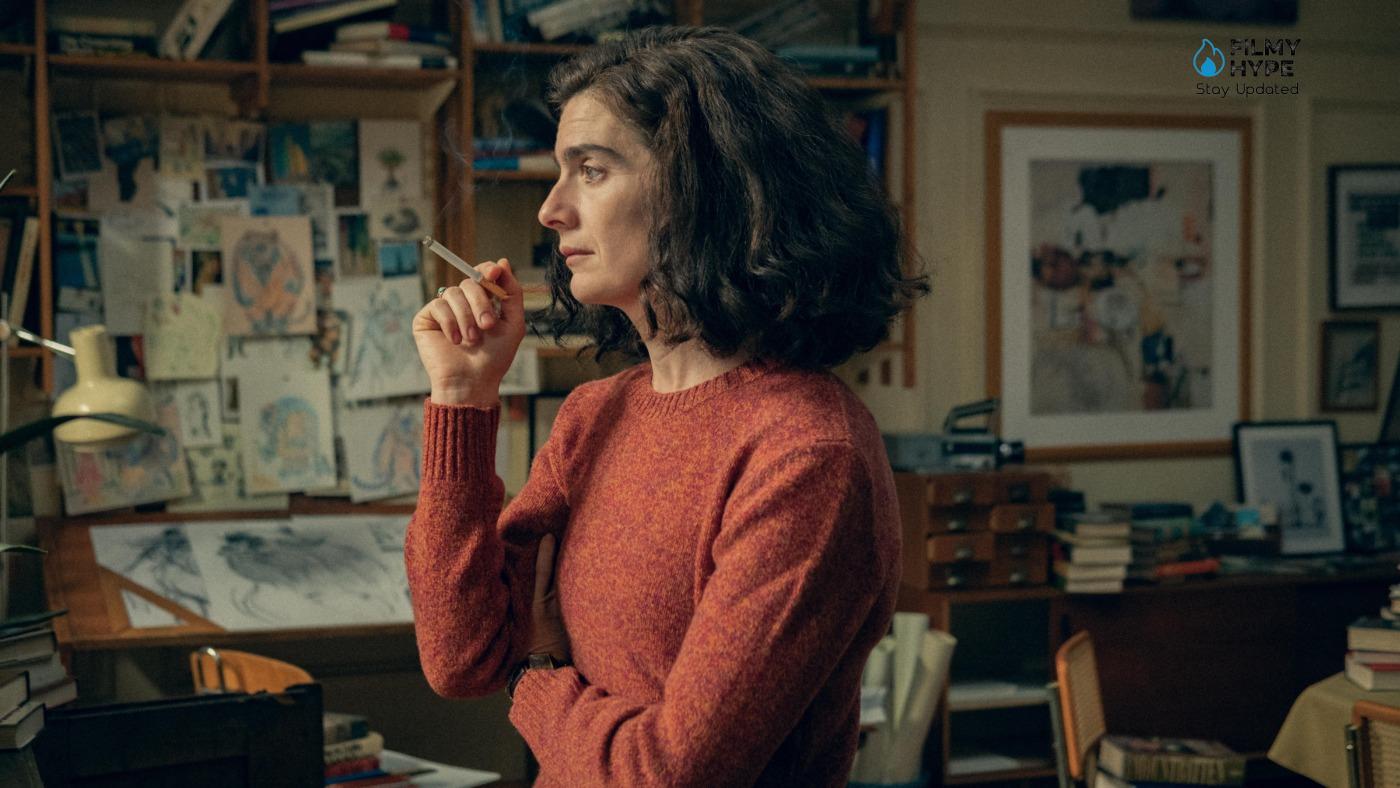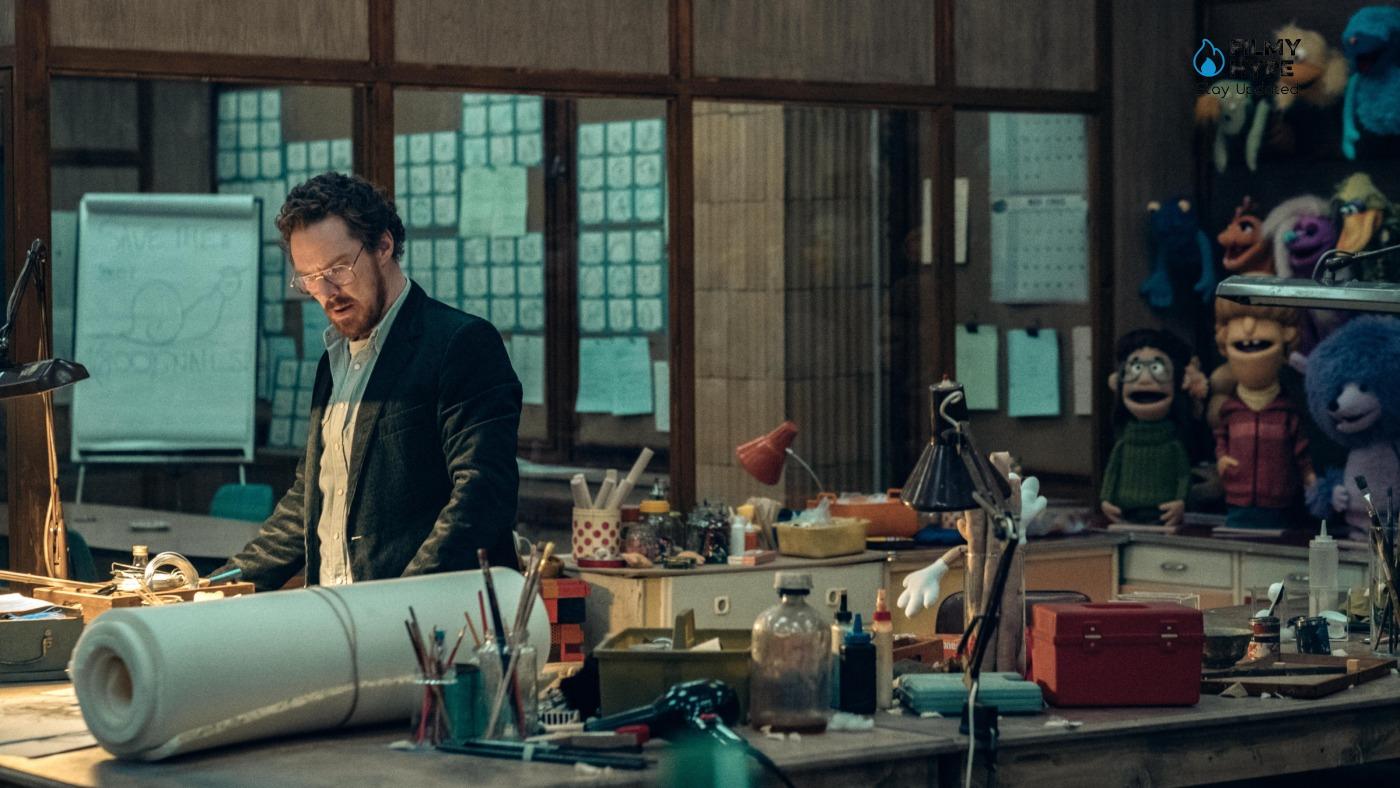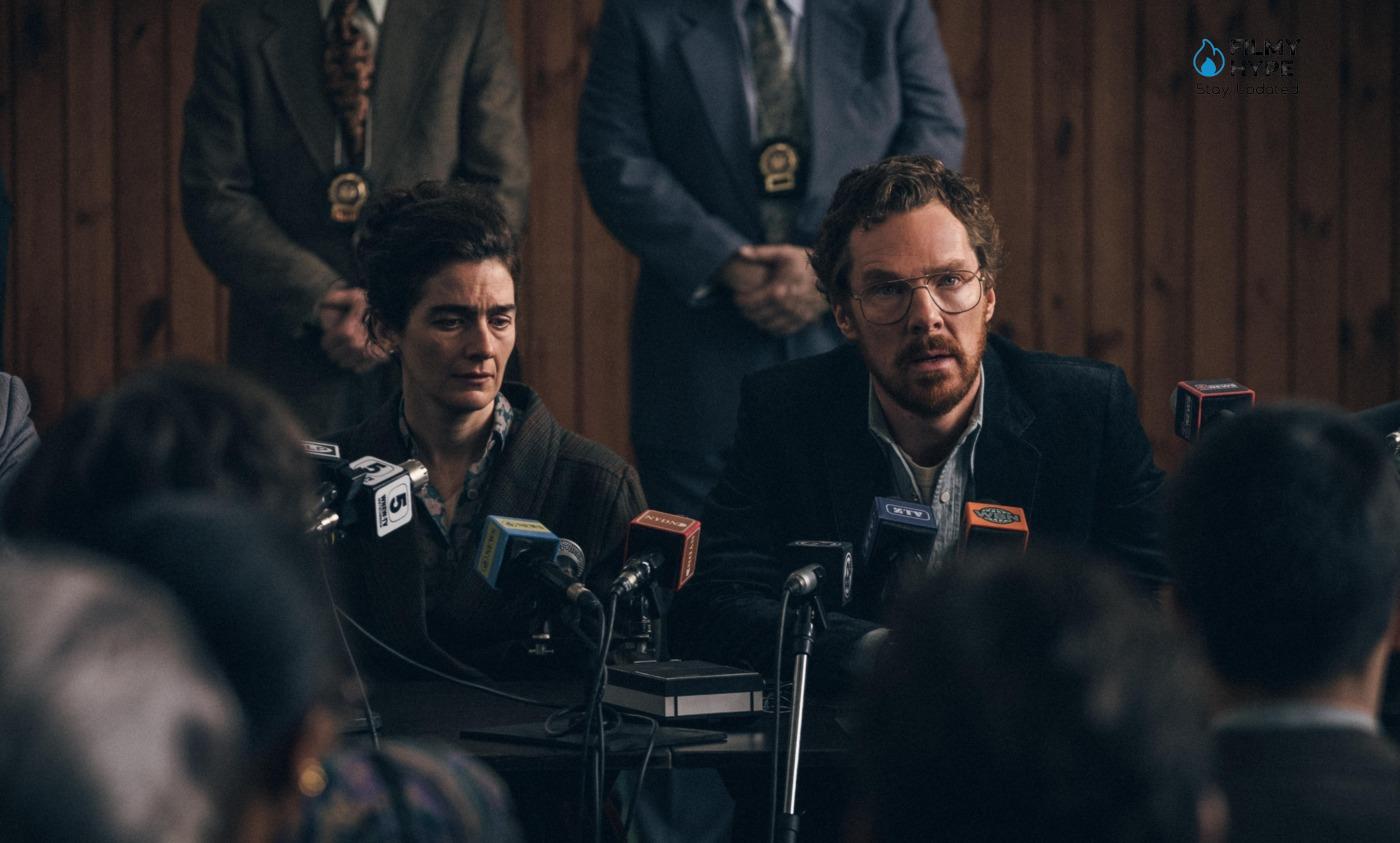Eric Netflix Review: Psychological Thriller That Exploits The Narrative Input Of The Missing Child
Starring: Benedict Cumberbatch, Gaby Hoffmann, McKinley Belcher III
Creators: Abi Morgan
Streaming Platform: Netflix
Filmyhype.com Ratings: 4/5 (four stars)
From May 30th on Netflix Eric, a 6-episode miniseries written by Abi Morgan (already screenwriter of The Iron Lady, Shame and Suffragette) and starring Benedict Cumberbatch (Sherlock, The Imitation Game) who is in better shape than ever. Even in this dramatic, difficult, and multifaceted role, the English actor enchants us. Becoming the center of a universe where everything is filtered through his point of view. Eric, the new Netflix miniseries curiously arrives at the same time as John Krasinski brings his imaginary friends to the cinema, colorful creatures and adorable little monsters, the last bastion of imagination at risk of extinction (in the potential visual concretization of any abstraction and the hyper exposure to contemporary images), and does so by proposing the degenerate counter field, that of hallucinogenic delirium.

Miniseries (or limited series, if you prefer) are now a relatively simple production effort, especially in streaming, because they allow you to grab big names from the star system and involve them in projects that do not require lengthy production times or exorbitant costs. Today, however, there are now too many, killing the very concept of seriality that keeps viewers glued for multiple seasons. Yet, in this serial mare magnum which we now navigate by sight, some miniseries stand out for their original and captivating workmanship. Among these, we certainly include Eric, highly anticipated since the first announcement, precisely due to the involvement of Benedict Cumberbatch, who had already distinguished himself on the platform as Sherlock Holmes of the 21st century. A series that impressed us not only for its story, but also for its staging, and which we are sure will climb the Top 10 of the streaming service very quickly.
Eric Netflix Review: The Story Plot
New York, 1980s. Vincent is the creator of the children’s program Good Day Sunshine, he draws puppets, gives them life, and gives them their voice: he is a creative genius, an excellent narrator, an acute demiurge but a terrible puppeteer of himself, an excellent maneuverer while everything about his private life seems to get out of hand. When his son Edgar disappears, the time comes for Vincent to search the city and himself in search of his son and the inner monsters ready to resurface. While everything around him seems to be falling apart and the only trace to follow seems to be the drawing of a monster named Eric found among Edgar’s sketches, detective Michael Ledroit is in charge of the case, determined to shed light on the child’s disappearance despite obstacles to the investigation.
Eric Netflix Review and Analysis
In Eric the imaginary friend becomes the enemy, an organic figuration of the shortcomings, of the gaps of a tested interiority, a body for the voices in the head of an unstable individual prey to the fumes of alcohol. If for little Edgar the big and hairy Eric (reminiscent of James Sullivan of Monsters & Co. ) is the puppet version of a father who must necessarily be represented – that is, refigured, reformed, translated into something equal and different by itself – to be assimilated in its distortions and accepted, for Vincent the monster becomes both an echo of conscience, a regurgitation of the repressed, and a nagging remorse. It is, after all, also the result of an unbridgeable perceptive distance between children and adults, a difference in vision – wonder on the one hand and problematization (if not anxiety) on the other – which allows us to associate with the picturesque and childish dimension of the characters Eric‘s thriller tones are Muppet-like, repainting everything with dark brushstrokes for a detective film sui generis.
In the neon lights of nightclubs, in the shadows and rot of invisible and subcutaneous criminal gangs, Eric smells (or stinks ) of noir (and isn’t Vincent an improvised investigator far from being a model individual?); in her interrogations with a co-protagonist – the rock-solid detective Michael Ledroit – intent on hunting down the king and questioning the suspects one after the other, Abi Morgan‘s creation has the flavor of a police procedural; in the damaged and dazed ruminations of the protagonist, in his split, in his shattered ego, the Netflix series becomes a hard and pure psychological thriller. Beyond Vincent’s imaginary projection, Eric reviews much more tangible and unpleasant monstrosities: the last ones, the marginalized, are monsters, who Abi Morgan sees fit to render so much in the frightening metamorphosis that their condition entails – relegated in a real underground counter-city, a little fantasy and very irregular upside down – as in what is the shared feeling and thematic core of the series.

The “not feeling at home”; exponents of a ruling class are monsters who, to gain public support, plan a blind mobilization that can only lead to ghettoization, cataloging, discretization of discrimination, and frantic integration; they are absent father figures, counterfeit points of reference and wounding; finally, there are a whole series of ” benevolent ” institutional individuals who do not shake off an age-old racially motivated negligence, white as a priority and black as a nuisance. Wanting to take on the role of investigator to find out what’s wrong in the new Netflix series, to unmask Eric‘s monster, it’s easy to catch a rejecting protagonist red-handed with the complicity of a writing that almost completely leaves out the suspense and the feeling of danger.
Vincent, a neurotic character who shows no signs of coming to his senses, becomes exhausted after a few episodes due to an irritating immobility: the one played by Benedict Cumberbatch – who offers an excellent performance which, however, borders on overacting – is too negative a character, with a fatal flaw too cumbersome to be able to align itself with the viewer, to arouse their empathy, and a difficult childhood is not enough to rehabilitate it. The consequence is that the spectator does not follow him with participatory fervor in his plan for him, causing chronic instability and a compromised trust toward him. For its part, the series never really manages to make us feel apprehensive but it remakes itself by creating a fairly composite puzzle that can only arouse a certain playful interest in associating the pieces and in rediscovering an expanded and branched context, which has the merit of treating spectators like puppets by directing and redirecting them towards false leads, removing and putting back into play, excluding and fishing out, reassuring and then instilling doubt.
What solves the main problem, in addition to the “sidekick” Eric who amuses in the contrast between his appearance as an enormous teddy bear and his scurrilous and grumpy expressions, is the emergence of a compassionate feeling (which is already something) in the face of extreme patheticism of a Vincent in the abyss, and the natural charisma of McKinley Belcher III in the role of Ledroit, who compensates and rebalances both as the only true agent of good and because, contrary to what happens with Cumberbatch’s character, the his is a hindered but linear, undaunted, perpetual motion. An old-fashioned, glacial, monolithic policeman, always on the spot and immersed with total abnegation in the case, Ledroi t is the true driving force of the narrative, as well as being the most successful and most (or rather, most effectively) investigated character in the intimate sphere, capable of shifting attention to one’s fate and distracting it from the central conflict.

In general, the best comes when Eric discovers the cards and transfers all the driving force and the rate of surprise of a whodunit onto the implications of a collateral case when he lets himself go to his soul drama when he digs inside and discovers that even a monster can have heart. In a world made of secrets, with a city that hides underground, far from the light and glances of the surface, a child entrusts all the difficulties of his relationship with his father to his imagination. A creative father, and a brilliant artist but, as often happens to geniuses, also a profoundly self-destructive man. Unable to live with himself, Vincent cannot live with others until he faces his reflection. The real one. If you’ve seen the Snowfall series, you already know everything. In the mid-1980s, crack cocaine was exploding in the United States. Beneath the city, an army of homeless and drug-addicted zombies moves in the darkness. Above the city, in respectable circles, the most widespread drug is alcohol.
Vincent comes from a prominent family in the city, he lives in luxury, in an environment where appearance is everything. A glass of whiskey or a glass of wine will never be seen as a problem in that environment. But Vincent goes much further, fueling his creativity, but also all the unpleasant and uncontrollable consequences of his disorder. Vincent is not the classic mentally ill person, because certain words were not used in his family. Certainly, however, he has serious problems that have dragged on since childhood and his parents’ attitude has not resolved or directed towards the right path. Vincent, his mind, his way of looking at the world and living together with others, are our guide in Eric‘s narrative world. As a result, we often find ourselves displaced and tossed from one atmosphere to another. Which works, but only up to a certain point.
The first two episodes will glue you to the screen. You want to enter the world of Vincent and Edgar, you want to find out – because from the first image, you are aware of the drama – what happened to little Edgar. Then, however, from the third point things begin to accumulate and the tension decreases. Then comes a big, macroscopic strategic error, which eliminates the suspense and consequently also the spectator’s interest. At least for a moment. Curiosity, the element that kept you glued to the screen, is missing. Of course: Benedict Cumberbatch is a monster of talent. As always. The actress who plays her wife, Gaby Hoffman (Transparent), is not up to par, also because there is something that seems out of place: despite her age being six years younger than Cumberbatch, she seems decidedly older than he. She’s too old. Dan Fogler (Fantastic Beasts and Where to Find Them) is always impeccable, regardless of the role he plays. And Detective Ledroit is a character who hides great, great charisma.

To avoid any kind of spoilers, I can’t go into details. But I can certainly remind you of this: we were in New York in the 1980s. When the police know only one method to deal with anyone who does not, in appearance, meet the standards of a respectable citizen: violence. An unspeakable, unjustifiable, heartbreaking violence. Just as all the other great tragedies of the mid-80s are heartbreaking, from AIDS to lives destroyed by drugs, from malfeasance as a style of conduct, even political, to the most vulgar discrimination. Violence, however, is associated with a counterpart. A fantastic, surreal, almost fairytale-like element. In a tragically dramatic story, we wanted to insert a part of narration in pure Christmas film style in the style of we all love each other, and it’s out of place. A lot of. Not because we don’t understand what it wants to represent, but because it trivializes everything. And it takes away verisimilitude.
It invalidates the effectiveness of reflections on what remains buried, while something – just something – emerges. And this is the real strength of the miniseries, inexplicably trivialized by incomprehensible choices: the underground. The unsaid. Attitudes that affect those around us without us even realizing it. While madness becomes a very different concept from that of mental illness: madness is the basis of the corrupt, greedy, and ruthless world in which we live. Eric‘s story is also a story of discrimination, also in this case already told about those years in which the specter of AIDS began to be felt, but at the same time, it is once again staged in a different, new, compelling way. There are many leads that Detective Ledroit comes across which lead him to question both the honesty of the NYPD itself, with possible corruption taking place, and the actions of the city institutions, perhaps colluding with unsavory activities. In the meantime, various suspects, close to the family, will appear, creating a puzzle in which not all the pieces will be very clear right away.

Among the cast, we mention Dan Fogler, an unforgettable adorable Muggle in the Fantastic Beasts saga, who here plays Vinnie’s best friend and partner, who in some ways represents a counterpart to the policeman and the protagonist himself within the narrative. Even in this case, it could only be a “convenient illusion” for the agent, to find meaning in the brutality of the crimes, which have markedly increased in a city where one cannot “even be trusted to let the child go to school alone”. own son,” as Vinnie will say. In short, what are we willing to believe to move forward? The mix of puppets and live performers, the direction halfway between family movie and detective crime, and the photography of a New York that has never been so fascinating and at the same time disturbing make the miniseries unique between two genres and between two focuses. To be seen.
Eric Netflix Review: The Last Words
Eric is a noir-tinged series with a procedural feel, a psychological thriller that exploits the narrative input of the missing child to scrutinize the shadows of New York in the 80s, moving from racial discrimination to homophobic prejudices, from the devastating effects of drugs to the corruption of the ruling class. Eric does not find his vocation in the adrenaline of research but draws strength from the curious doubling of a divided protagonist and the enthralling dedication of a highly successful co-protagonist. In short, the Netflix series disguises itself as a detective story but rediscovers itself as a drama on the effects of apathetic and disinterested fatherhood.
https://www.youtube.com/watch?v=eGaAl_8QW2c






